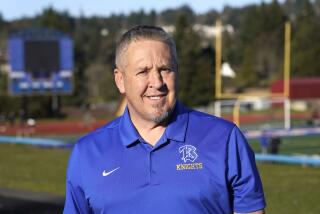Bible Scholars Say Jesus Didn’t Create or Teach Lord’s Prayer
Jesus probably did not create the Lord’s Prayer or teach it to his disciples, although certain phrases in Christendom’s central prayer may have been used by him, according to an ongoing national seminar of biblical scholars.
A majority of the two dozen scholars believed that the Lord’s Prayer was composed by the early church a number of years after Jesus was crucified.
Nevertheless, the so-called Jesus Seminar, which met in Atlanta last weekend, also decided that the phrases “hallowed be thy name . . . thy kingdom come . . . give us this day our daily bread . . . forgive us our debts” reflect fragments from prayers by the historical Jesus.
The Lord’s Prayer, recited in virtually every Christian service, has been considered to be words taught just that way by the Jesus of history to his followers. But the Jesus Seminar, which has irked many conservative scholars and denominations with its skeptical views, became the first research group to challenge the prayer’s origin.
Seminar members voted this way on the Lord’s Prayer as a whole: Three said it came from Jesus, six said it probably came from him, 10 said it probably did not and five said it did not.
Robert Funk, seminar founder-director and a former president of the Society of Biblical Literature, said the twice-yearly meeting attempts to reach a consensus on the core of teachings by Jesus to further scholarship and to introduce the public to research rarely heard outside scholarly circles. More than 100 scholars have participated in voting sessions since 1985.
However, two scholars not involved in the Jesus Seminar expressed concern in interviews Monday that reflects a general unease by many moderate Christians with the unprecedented voting method and its effects on the average churchgoer. They said the provocative findings would instead “drive a wedge” between biblical scholars and the church.
“If the public thinks that the scholars are being destructive rather than constructive, then the seminar will have done the church a disservice,” said Jack Dean Kingsbury, a New Testament specialist within mainline Protestant scholarship. Kingsbury, of Union Theological Seminary in Richmond, Va., added that when scholars try to go behind the Gospel representations of Jesus they work “in a very nebulous area.”
Marianne Meye Thompson, who teaches the New Testament at the evangelical Fuller Theological Seminary in Pasadena, said, “I think most scholars would concede that the Gospels are paraphrases of Jesus’ teaching.” But she added that “I am not sure the seminar is doing the church a favor.”
Funk said that the seminar might get an angry reaction on the latest vote from fundamentalist Christians, who believe in a literal reading of the Bible.
The Lord’s Prayer appears in two of the four Gospels: Matthew (6:9-13) and Luke (11:2-4). Scholars generally believe that those two Gospel writers got the prayer from a source, never found but labeled “Q” by researchers. The wording varies, however, in Luke and Matthew.
Scholars at the Atlanta meeting tended to agree that the prayer likely derives from the religious community that composed the “Q” document in the mid-1st Century. That would have been well after Jesus’ Crucifixion about AD 30 and before the writing, after AD 70, of the Gospels.
Participants also agreed that Jesus used “abba,” an informal term for “father,” to address God in prayer.
“I think (Jesus) prayed, but I don’t think he made a big deal about it,” said Methodist minister Hal Taussig, a faculty member of St. Joseph’s University in Philadelphia. He gave the principal arguments for the Lord’s Prayer as an early church product.
Charles Hedrick, professor of religious studies at South West Missouri State University, said in an interview that he was convinced that the Lord’s Prayer “was the kind of prayer that would have been needed in a community which had a formal liturgy, a formal worship.”
The closing line “lead us not into temptation,” to which Matthew adds, “but deliver us from evil,” was thought by scholars to have been created by the early church.
Funk said the voting tends to identify some trends of research that otherwise might not show up for years if limited to the much slower procedures of publishing findings in journals and books. The seminar earlier found that very few of its members believed that the historical Jesus predicted his own Second Coming or that Jesus said the world was about to end in an apocalyptic chaos.
In the case of the Lord’s Prayer, the sentiment went squarely against the widely respected assessments of a couple decades ago by German scholar Joachim Jeremias and American scholar Norman Perrin that the Lord’s Prayer was surely taught by Jesus himself, ranking in historical authenticity with most of Jesus’ parables and sayings about the kingdom of God.
More to Read
Sign up for Essential California
The most important California stories and recommendations in your inbox every morning.
You may occasionally receive promotional content from the Los Angeles Times.








